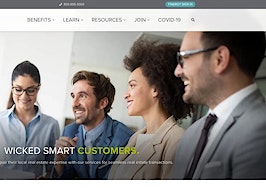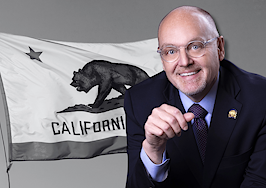When Nina Dosanjh was in her very first role as a young leader of the San Francisco Association of Realtors, a woman at a banquet came up to her and asked a seemingly innocuous question: “What country are you from?”
When Dosanjh replied, “America,” the woman persisted. “No, really, what country are you from?”
It was at that point that Dosanjh realized that they were having a different conversation than she thought.
“Because I didn’t look the way that she looked and that was the question that I was being asked,” she said. “[It was] the first time that I felt like, ‘Oh, wait a second. I’m an Other.”

Nina Dosanjh
Dosanjh, director of strategic alliances and technology at Vanguard Properties, spoke on the third day of the Council of Multiple Listing Services’ annual conference, which is entirely virtual this year, in a session called, “Walking the Walk. How to Build and Support Diversity in Your Organization.” CMLS dedicated Thursday to the topics of fair housing and diversity and inclusion.
Asked what she did after this experience she described as “very jarring,” Dosanjh said, “I did what many of us do … and that is just to be quiet. I think that sometimes it’s more comfortable to just not have the conversation or just say, ‘Hey you know you could have asked me that in a different way.'”
Experience has shown speaking up can be “problematic,” Dosanjh said, but she thinks that recent events are giving everyone the opportunity to open up.
“We should say when things make us uncomfortable or when we’re posed a question that maybe could be asked in a different way because sometimes it’s just an unknown factor, right?” she said. “You just don’t know what to say or how to ask something.”
Fellow panelist Cliff Long, CEO of the Orlando Regional Realtor Association, described his first experience applying to be the CEO of a real estate organization he declined to name. He got the job, but later learned that, although he was considered the best candidate, the board of directors had questioned whether a black man was ready to lead the city’s Realtor organization.

Cliff Long
“Imagine in the 2000s, that’s the discussion that must come up,” Long said. What did he do about it?
“I knew that people were scared to death. They thought I was getting ready to hire all the black folks in town to come work for the association. I didn’t do that. I worked my butt off,” he said.
“I made sure that we were the No. 1 association in America within that area within that realm to make sure that the people who came after me are never again judged by the same standard by which I was judged, which almost didn’t give me the job.”

Monica Peña
Panelist Monica Peña, CEO of the Greater McAllen Association of Realtors, relayed her own experience seeing white men rise in the association ranks faster than she did, despite her wealth of experience.
“It made me work a lot harder and it didn’t keep me from focusing on my goals and focus on what I wanted to do and what I want to do, but at the same time it just gives you pause and it makes you reflect on your surroundings and what you have to work against,” she said.
While Hispanics make up 38 percent of the population of Texas, they’re only 12 percent of CEOs and association executives in the state’s Realtor associations, she added.
When asked what they were doing to build an inclusive culture at their organizations, Dosanjh suggested reaching out and encouraging people to take on leadership roles.
“Had somebody not tapped me on the shoulder and said, ‘You would be really great at this’ or ‘You would fit really well into this role,’ I wouldn’t be here,” she said.
“It really took people showing me the way and I think that we all as leaders have a responsibility to our membership, to our organization and to our communities that we serve that we ensure that the people who are serving in those roles actually look like the communities that are being served.”
Other ways to grow an inclusive culture are to support organizations and participate in community events that foster diversity and to encourage Realtor members to understand all of the cultures and communities they serve through educational opportunities, according to Dosanjh.
Similarly, Peña said that when she conducts a new member orientation every month she notes what each newbie’s previous career was so that she can ask them to get involved in relevant association committees.
“But on top of that, it’s very incumbent on, as a CEO, to have our leadership acknowledge the problem and then work with very specific steps for our future to have diversity inclusion all the way through leadership and encouraging not only local volunteers to get involved with our association, but on a state and national level as well,” she said.
For Long, building an inclusive culture at his association was easy: He looked at the people in his community and who are buying homes. In Orlando, that meant international buyers, from England to Brazil. So he just changed one policy — he would hire people who were bilingual.
“I didn’t have to go out and discriminate. Just by making sure that I had people who could communicate brought all the right people in. Now we have LGBTQ. Now we have black. Now we have Latino. Now we have Brazilian. Now I have Indian. Just by going out and attempting to represent the community, to represent where the money is coming from in Orlando, and making that my hiring practice,” Long said.

Wes Wiggins
Panel moderator Wes Wiggins, director of MLS and industry engagement at Zillow, noted that that was one way to approach the issue of diversity with an organization’s leaders: Follow the money.
“The fact of the matter is your present and future clients are represented in these diverse groups. And if you’re going to be successful, you have to be able to address those groups and you have to be able to do it in a manner that is respectful and inclusive,” Wiggins said.
“You’re not doing this because you’re on some personal crusade,” he added. “Today we’re talking about business, and the business is becoming more diverse. That’s the easiest way to convince your leadership to have a diversity and inclusion policy or council or whatever committee is by saying it makes business sense.”
About a third of Orlando’s population is Latino. So in that vein, Long decided to offer his staff Spanish classes for free so that they would be able to communicate with more of those walking through their door. “I can’t just hire all Spanish-speaking personnel because then I reverse discriminate against the people who are already there. So what do you do? You make sure that everyone has the same opportunity,” he said.
Asked how to make sure staff members feel comfortable bringing up an issue or situation they feel goes against the inclusive policies of an organization, Dosanjh emphasized communication and listening to what staff members have to say about what they’re feeling.
“There should be a policy for staff to be able to report ways that they’re feeling and that should be a process that is obviously anonymous. But … it’s not just the reporting mechanism, it is the culture of what you’re developing inside: the office and how open your communication is,” she said.
“I think that there does have to be a place for staff to have these open meetings where it’s like, ‘Hey, we want to be better.’ We are trying to build this culture and allowing that open space for staff to talk about how they feel. Sometimes that could be a Pandora’s box and we all know that from just our own experiences, but I do think when people come to the table with an ear to listen, I think that there’s a lot to be learned from that.”
Long emphasized that he calls out when people get out of line and makes sure that the leaders under him share the same ideal.
“[Staff has] to know that at every level of leadership at ORRA … bigotry, hatred, sexism, racism — it’s not going to be tolerated. So that when they come to work they can feel like they’re in a safe environment and that their views are respected,” Long said.
Wiggins pointed out that inclusivity is an active process. “You can’t just sit back and expect the situation to rectify itself. You can’t put it on autopilot. Ultimately it is about meeting the needs of our prospective customers,” he said.
Long urged conference attendees to not be afraid to have difficult conversations and “become comfortable with the uncomfortable.”
“The things that we’re going through now as a country are 60 years old,” Long said. “These are conversations that we should have been having in 1964, right after the Civil Rights Act passed, but what we did was we glazed over it and we pretended ‘Oh, are we good now?’ No, we ain’t good.”
“These are things that we should have talked about a long time ago that are now coming to the surface because they were neglected and glazed over.”
People today still call him “Boy,” Long pointed out.
“They don’t mean anything by it,” Long said. “They don’t know any better. But I have to tell them, ‘You can’t call me Boy anymore.’ And these are older gentlemen who mean well. But you have to become comfortable with the uncomfortable and put people in their place because it’s the only way that they’re going to learn.”
But when you do do, do it with love, he added.
“They always say you catch more flies with honey than you do vinegar,” he said. “Don’t be so sharp that people are now afraid and they’re running from you and they don’t ever want to talk to anybody else like you again.”
“You’ve got to be able to have the conversation with them, cause them to be comfortable with the uncomfortable, and then walk away having had a constructive conversation. We can no longer afford to run from conversations that we should have had 60 years ago. Today, while it’s fresh on our minds and while it’s a hot topic, let’s have those discussions.”













